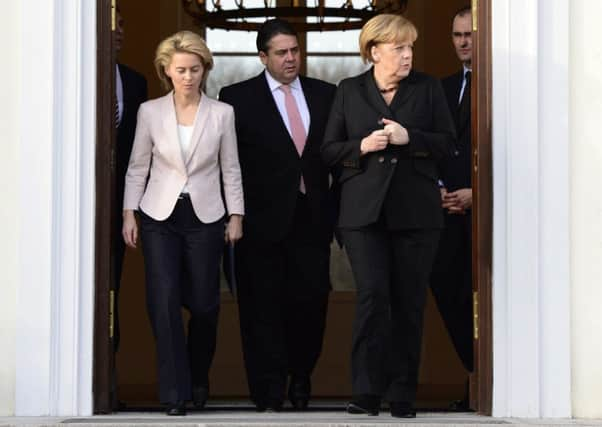Bundestag elects Merkel to German chancellorship


Mrs Merkel now heads a “grand coalition” of Germany’s biggest parties – her Conservative Union (CDU/CSU) block and the centre-left Social Democrats (SPD), which are traditional rivals.
Parliament’s lower house elected her as chancellor by 462 votes to 150, with nine abstentions.
Advertisement
Hide AdAdvertisement
Hide AdSPD members voted on Sunday to back the coalition after painstaking negotiations.
The party hammered out a minimum national wage, an hourly rate of €8.50 (£7.11) that will come into force in 2015.
The coalition will move Germany slightly to the left but is expected to take a largely unchanged approach to Europe’s debt crisis.
It features Germany’s first female defence minister, conservative Ursula von der Leyen, and sees former foreign minister Frank-Walter Steinmeier, a Social Democrat, return to his old job. Finance minister Wolfgang Schaeuble, a powerful figure in Europe’s debt crisis and a trusted ally of Mrs Merkel, remains in post.
“His name stands for euro stability and I’m glad that he’s continuing,” Mrs Merkel said after details of the new line-up emerged.
After the confirmation vote in the Bundestag, Mrs Merkel said: “I accept the election result and thank you for your trust.”
Smiling, she received a bouquet and shook hands with other MPs. She was due to visit president Joachim Gauck at his palace before returning to parliament to be sworn in.
The parties’ effort to form a government after the national elections on 22 September, in which Mrs Merkel’s conservatives came close to a parliamentary majority but saw their previous coalition partners lose all their seats, has been the longest in post-war Germany.
Advertisement
Hide AdAdvertisement
Hide AdThe issues that had to be agreed upon ranged from the direction of the economy to whether Germany should commemorate the 200th anniversary of Beethoven’s birth.
Negotiations were extended by the SPD decision to put the coalition deal to a ballot of all its members.
It won approval last weekend but some remain wary because the party emerged weakened from a previous grand coalition in Mrs Merkel’s first term, 2005-09.
At least 42 MPs did not vote for the chancellor yesterday but, given the new coalition’s enormous majority, that is unlikely to worry her.
Conservatives and Social Democrats hold 504 of the 631 seats. Germany’s best-known former Communist, Gregor Gysi, becomes the opposition leader; his hardline Left Party is the bigger of two left-leaning opposition groups. As a result of the opposition’s weakness, Germany’s biggest-selling newspaper, Bild, declared on yesterday’s front-page: “Dear grand coalition, we’re your extra-parliamentary opposition now!”
Its editor Kai Diekmann wrote: “This parliament is too weak; its opposition too small and too left-wing.”